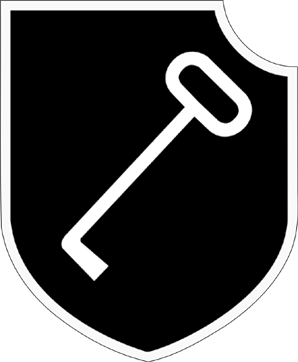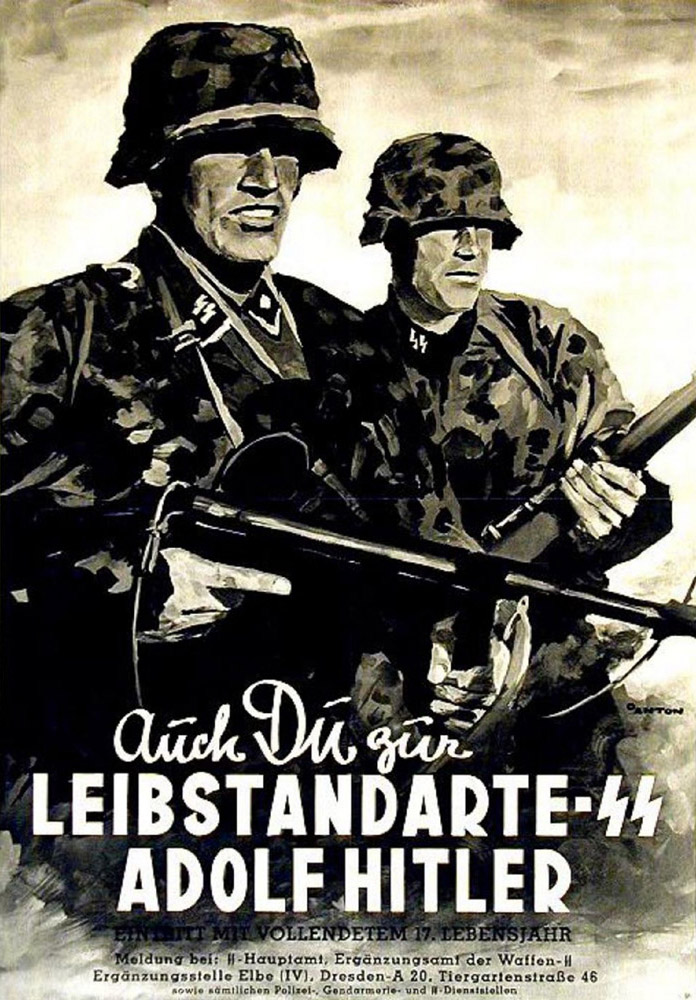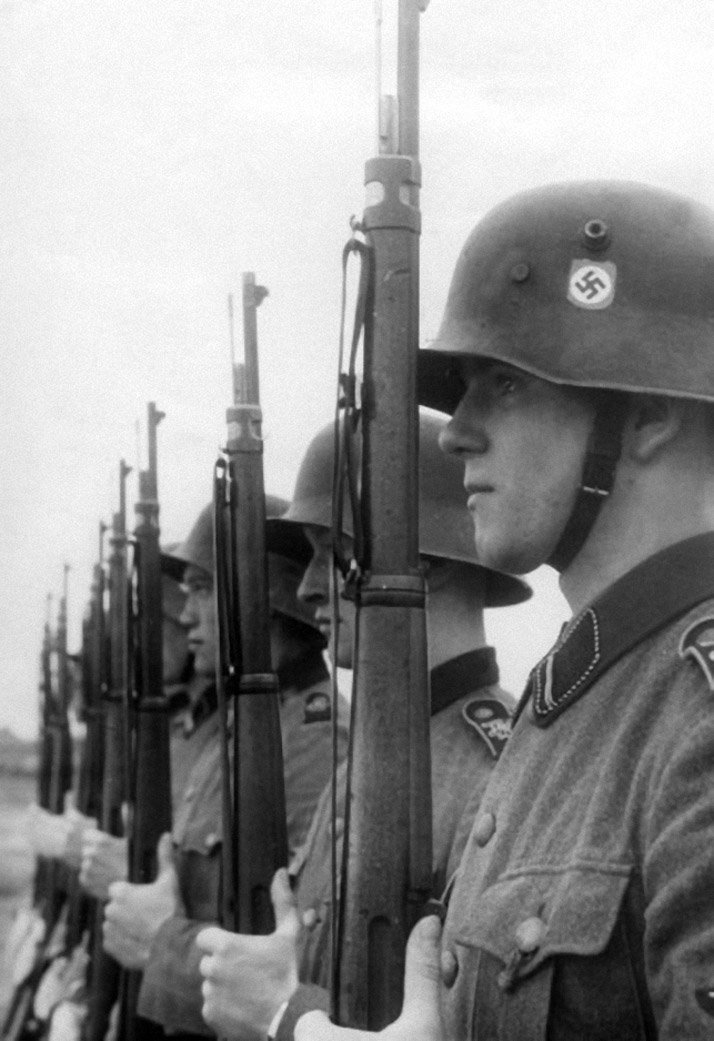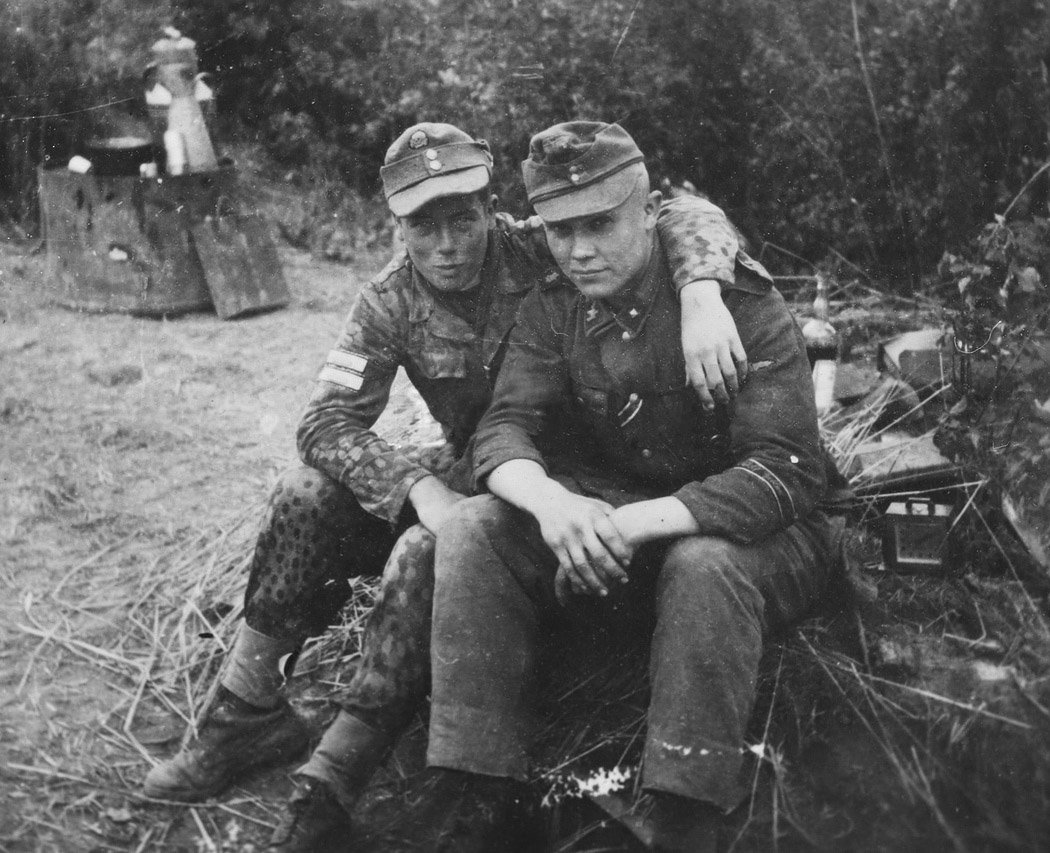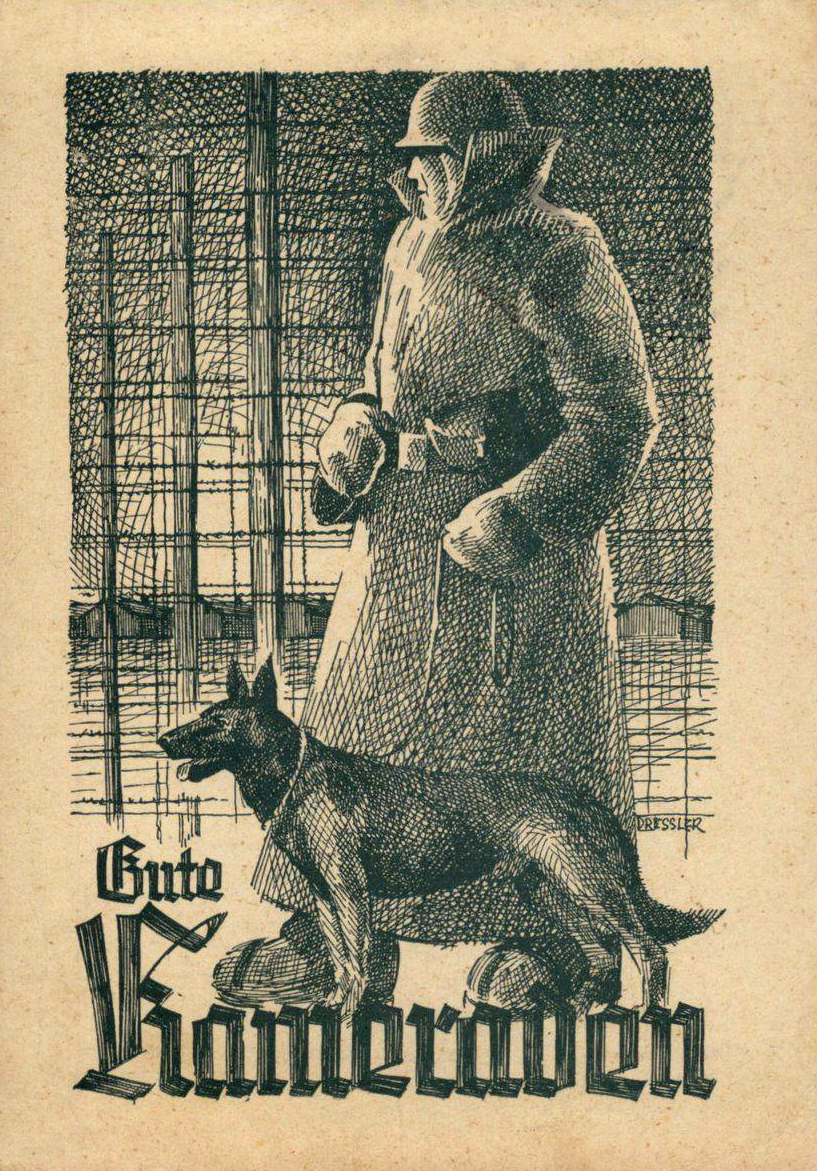Thanks for meeting me; I wanted to just ask a few questions to keep for my collection of former members of the Waffen-SS. Can I start by asking why you chose this branch to enlist into?
Amadus: Yes my friend, you could say my father was the one who encouraged me to join the Waffen-SS. I must say that I also wanted to be a part of the SS, they were thought of as the bravest and most elite of the armed forces. I knew I would be called up so I made the choice to join before that happened. It also looked better to be a volunteer.
It was a happy day when I received my papers telling me I had been accepted into the Waffen-SS as a volunteer. I was even more thrilled when I found out I was to be assigned to the LSSAH, the Führer's own. I felt that I not only belonged to the best in Germany, but the best in the entire SS. This was in late 1941.
I was not a fanatic like it is presented today of SS men, I knew National Socialism was a good idea but I was not a chest thumper. I was surprised that in the SS there were no political discussions; it is a false idea when people say there was. We focused only on matters of war and military bearing.
You were part of the reconnaissance regiment of the LSSAH?
Amadus: Yes, right after our training for basic military life, we had to be assigned to a specific arm, some chose theirs and others went where they were needed. I went where I was needed as I had friends who I followed. I was part of the flak training unit in Arolsen [a small town in northern Hesse, Germany] to learn the concepts of the weapons.
In the LAH we were assigned to the flak 38 to guard against low flying Jabos [American fighter planes] which would sneak down to strafe and bomb. The 38 was very effective against them. We once hit a Soviet plane diving right at us, and destroyed it with one burst. We took a terrible toll of enemy aircraft with this weapon.
After doing the flak training I was moved into the recon unit of the LAH, and had to do more training for this unit. I was placed under the command of Kurt Meyer who was already a Knight's Cross winner.
What was your first battle in the LAH?
Amadus: It was at Kharkov [Ukraine], this city was a focal point of battles for the SS from 1942 until 1943. The Soviets would capture the city and then we had to recapture it. The army ran away as usual and we had to clean up their mess. These were easy battles until we got into the city, the Soviets sat up in every house and building.
Most of our losses were from the soldiers shooting down on us, so we learned to have weapons trained up at all times. We took out a platoon who opened fire and showed themselves without seeing our gun. We raked them and silenced them; our shells went through the walls to get them.
We also had our losses as well, the Soviets were very sneaky and dirty, and they would play dead and then attack us from the rear. This is why so many would appear to shoot wounded soldiers. In reality we learned to shoot anyone laying down, to make sure they were not able to attack us from behind.
This happened once to my unit, and I lost a good NCO. The Soviets threw grenades at us and caught us by surprise as we thought they were all dead. Our NCO dove on the grenade to save us. He and other comrades died, I drove with my comrades later to give them all a good burial. This was a hard duty for a young man, but war toughens you up fast.
You also fought in Normandy with the LAH, can you describe the fighting?
Amadus: Yes, I was on the invasion's front and the fighting was terrible for us. We arrived too late to stop the invasion. By the time we arrived, which was piecemeal due to the Allied air forces, the Allies already established themselves. All we could hope to do was contain them by setting up lines of defense.
This worked for a couple months but as they became stronger, we became weaker. They could easily replace the heavy losses they suffered, but we could not replace the light losses we suffered. Our Panzers for example, they would knock out many Allied weapons, but they also could be knocked out.
We had very high kill ratios but the Allies just shrugged them off like nothing happened, we could lose one gun and it was irreplaceable. Our replacements were hard to come by, and often destroyed before arriving at the front. I have mentioned to you before the Allies vastly outnumbered us in Normandy, but to hear them tell it, they act like they were the ones vastly outnumbered.
They could move all they wanted, we could only move at night. Every one of our positions was heavily camouflaged to protect against the ever present danger of Jabos or spotters. They also had the naval guns that could fire for many km behind the lines. The spotters would see movement and the next moment an hour long bombardment would happen. When we could attack without the air threat, we had success and pushed the enemy back but would always be stopped by the mass artillery they could bring to bear on us.
I still see the destruction they brought to Normandy, I felt bad for the French who had to see all they built destroyed. War is terrible, it is even worse when brought to civilians and their cities. I saw many French who had been killed by the Allied bombings and careless shelling of towns.
We had orders to avoid needless firing on buildings, unless we were receiving fire from them. Some of our men even tried helping a French family rebuild their cottage that was hit by a stray shell. They had been friendly to us and sold us cheese they made. They were one of many who did not see us as the enemy of France.
While in Normandy we also had to deal with the fighters behind the lines, the Allies used French civilians who were spies. They would attack medical trucks and trains; they had no care for the laws of war. Once, when we had to take a vehicle for repair, we stopped to rest as we had time. We stayed away from it so not to be close if it was attacked.
I noticed terrorists looking over it and stealing our gear, they soon went looking for us. We hid from them, and I learned then to always keep a weapon on me. They looked like the gangsters from a crime movie. They had a very bad reputation for killing any SS men outright in cold blood. Most I learned later were communists with many Jews in their ranks.
We had times when our rear hospitals and aid stations were attacked; the HJ Division had an aid station overrun by Canadians where they killed some of the wounded. The fighting was very savage at times, and I know the Americans and Canadians had allowed no prisoners to be taken for awhile. I saw personally some German soldiers who had been shot down after they surrendered.
They were shot in the back and one in the head, but we could not document as no one had a camera. I saw they had been searched first with all private contents thrown to the ground. I also saw a French police soldier who had his throat cut after being tied up. There were many more that I heard of after the fighting. Yet here we have the Allies claiming we were the ones running around killing prisoners and civilians. This is a falsehood. Our pride and discipline were our honor.
At no time did I ever see any German soldier shoot an unarmed person during my time in the LAH. Unless there was a very good reason for such an action, it would have invited a court of honor and possible execution. Even though we had disdain for our enemies we would not stoop to their level. I will say too we knew not all were bad, I heard of many examples of fair treatment.
Amadus: You know my thoughts. I think they are very one-sided and made up from Allied propaganda. In my years as a soldier of my nation, serving in the most elite my nation fielded, I never saw any examples of German soldiers committing crimes. You asked me before about the confessions after the war.
I can tell you that what happened to us after the war was a crime in itself. The confessions of my comrades were forced and coerced by sinister men. They used their tricks on me also, and for mere boys and young men, it was easy. All we wanted to do at the end was go home.
The Allies had other plans for us Germans, I saw the countless dead from the camps we were herded into. My time was hard, and I saw many comrades die due to abuse and starvation. We had to give away dear items just for a bite to eat or a drink. The Americans and French were the worst; they killed many after the war and then hushed it away.
I had to roll comrades off trucks as they were dead, and our open air drives took days so we could not have a body on board. No burial or dignity, only a dirt road where we prayed a caring civilian would have mercy and give a proper burial.
I was beaten and threatened; one comrade who survived was made mad by the beatings. Testicles were kicked and squeezed, ear drums ruptured, noses broken, and backs whipped. One Jewish interrogator, Perl, even seduced the wives and girlfriends when they came to visit. He would get them drunk and then take photos to show the prisoners, all to get a confession.
The stories my comrades told me after were revolting, yet we all went through it together. Being SS men we were accused of very bad crimes, even with little evidence. Then with the badgering, torture, and threats my comrades admitted or agreed to such things thinking it would get them home sooner. This was a mistake.
There is a saying where the victor gets to write the history, and our story is an example of this. The Soviets put out many false stories at the end, telling how we killed many towns; I know they are the ones who did it after. I spoke to many Russians who fled to Germany and told of terrible retribution for those who lived behind German lines. They deported whole towns who were friendly, even the children.
I was told by one witness he saw young children who had been hung for being in youth organizations like the HJ and BDM. Young children! Yet we are said to be the evil ones with no souls. We protected the innocents from beasts like this. Look, everywhere we went, the LAH, we were welcomed by the populations, Russia, Italy, France, Belgium, and Hungary.
They fed us, cared for our wounds, and even some soldiers' need of sex, yes many SS men had relations with the women from these lands. You never hear of this today, but they were willing and actively sought our men, I would hear girls say SS men are so handsome often. These were not prostitutes either, but the single girls, and lonely widows who sought company.
I will share with you, my good comrade Lenz had a very pretty Italian girl who he went missing for when she pulled him away for a weekend at a lake, he shared that she went to Paris and bought some very seductive clothing for him to see. It was too much for him to resist, lucky for him our commander saw her and understood, so he received only very light punishment with cleaning duty. While in Belgium, I met a young girl who I would get to spend some time with as well, so I understood. I went to look for her after the war, but she was missing, a friend of hers said she was identified by communists and she ran away but no one ever saw her again.
I want you to know we are not the bad soldiers that our enemies say we are; we respected people and property in all nations. If any of the claims against us are true it would be only due to loose cannons who acted on rage without orders. I can say I saw this in the end, a Belgian man had shot a German soldier and ran into his house, not knowing he was seen by a patrol.
His home was fired on in rage and burnt down, his wife ran out but due to the smoke soldiers fired on a silhouette not knowing it was a woman. This is far from a crime on us, it was a crime that he shot at German soldiers. These are the examples that are then paraded around by "witnesses" who say we did this in cold blood.
You mentioned you were in Prague at the end of the war?
Amadus: Well yes, and no. I was part of the training unit by Prague. A battle happened earlier, the relief of Budapest by the LAH. This was part of a large SS Panzer corps. They tried relieving trapped units, and catching Ivan at a weak spot, but he was strongly fortified. The attacks made good progress at first, and then ran out of steam, just like the Ardennes [the so-called 'Battle of the Bulge'].
The Soviets sent in agents to stir up the Czech communists who rose in a small revolt. We were brought into the city to fight them, which was easy but we had the Soviets on the doorstep, so we were ordered to fall back. Doing so doomed many Germans who were trapped in the city. The communists hung Germans from lamp posts as acts of terror.
I saw a young German nurse who worked at the hospital, and she refused to leave saying her patients needed her. She did not listen when we said the enemy was being very cruel to Germans. I fear for what happened to her, as once the city fell all Germans were faced with a hate-filled enemy.
I saw many civilians who were victims of abuse; one was a very young girl who was savagely raped and beaten. These scenes happened all over the region; Germans were expelled, killed, raped, and beaten. The terrorists were the worst, they preyed on the civilians when no soldiers were around. It is said we were hard on them when captured, I understand why after seeing what I saw. They were vile fighters that knew no laws or decency.
This is why I cling to my dogs now; they are very loving and forgiving when man is not. They have helped me to forget the war and to heal. Many of my comrades have had to heal in their own way. We were too proud to say we are the victims in all this, and now we can not as laws say we can be punished for not agreeing with the victors. That is why I only tell you and my comrades these things.

